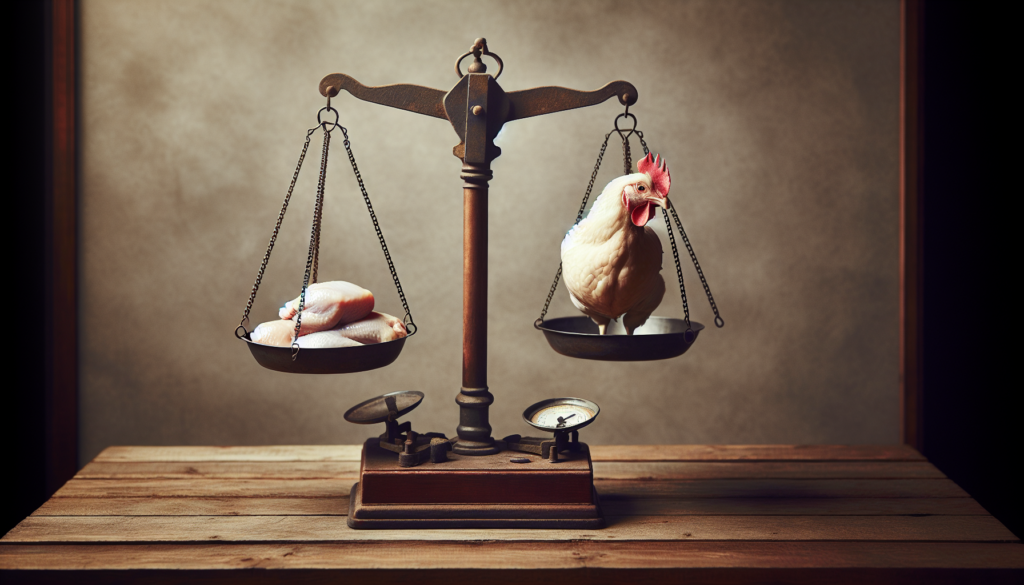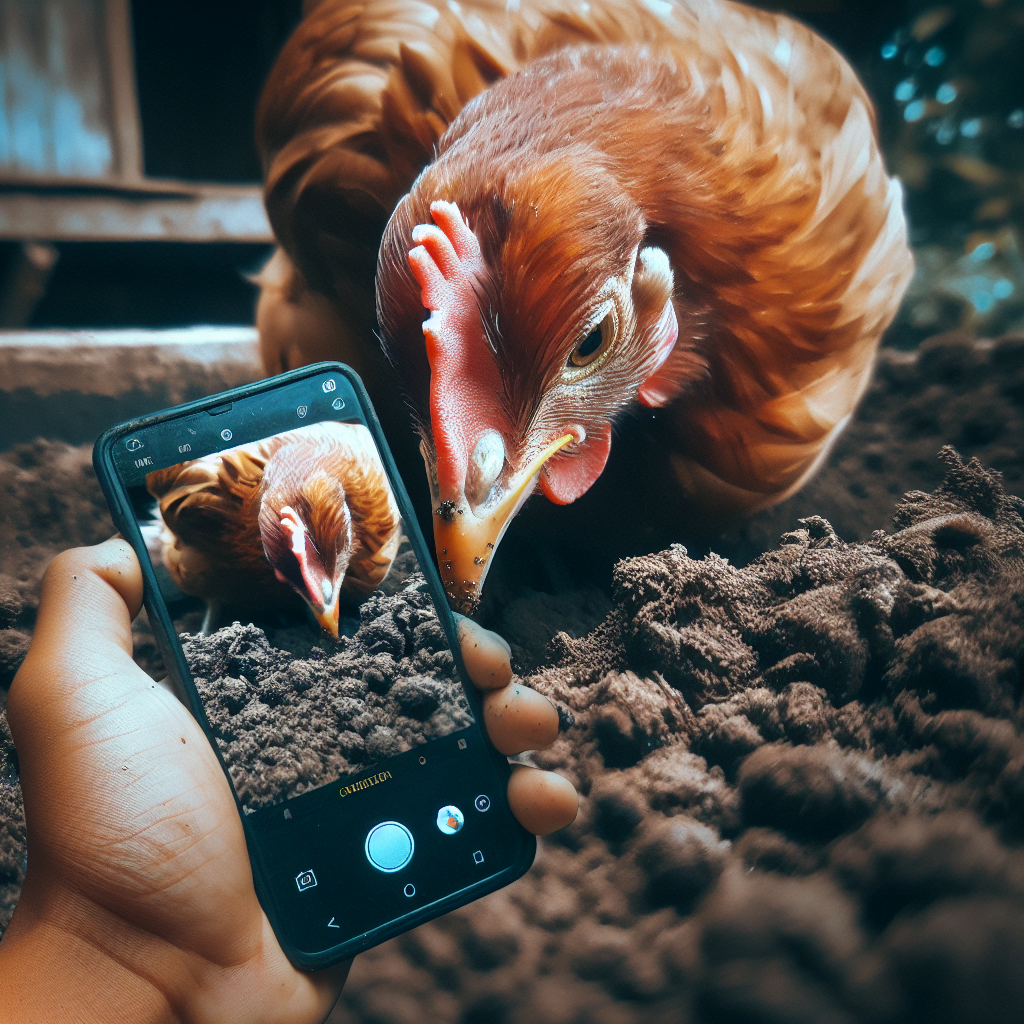Are you curious about the delicate balance between regulations and ethical considerations in the bustling world of the poultry industry? This article will provide you with a glimpse into the intricate relationship between these two facets and explore how they intersect in this ever-evolving field. Join us as we uncover the fascinating interplay between regulations designed to maintain safety standards and the ethical responsibilities that shape the way poultry farms operate. Get ready to gain a deeper understanding of how these crucial elements come together to create a sustainable and responsible industry.
The Importance of Regulations in the Poultry Industry
The poultry industry plays a vital role in providing a consistent and affordable source of meat and eggs for consumers around the world. However, ensuring the safety and well-being of both animals and consumers requires a robust regulatory framework. Governmental regulations, food safety standards, and welfare standards are all essential components of this framework.
Governmental Regulations
Governmental regulations provide a legal framework for the poultry industry, outlining specific requirements and guidelines that must be followed. These regulations cover various aspects of poultry farming, including biosecurity measures, environmental protection, and worker safety. By establishing clear rules and standards, regulatory bodies aim to ensure the responsible and ethical management of poultry operations.
Food Safety Standards
Food safety standards are crucial in the poultry industry to prevent the outbreak of diseases and the transmission of harmful pathogens. These standards govern the handling, storage, and processing of poultry products, including practices related to sanitation, proper refrigeration, and labeling. By adhering to food safety standards, poultry farmers and processors can prevent contamination and protect consumers from foodborne illnesses.
Welfare Standards
The welfare of animals in the poultry industry is a significant concern for ethical considerations. Welfare standards aim to ensure that poultry are treated with care, promoting their comfort, health, and natural behavior. These standards address factors such as housing conditions, stocking density, access to water and food, and the prevention of cruelty and unnecessary suffering. By applying welfare standards, the poultry industry can promote the ethical treatment of animals and enhance consumer trust.
The Role of Ethics in the Poultry Industry
Ethics goes beyond legal obligations and focuses on doing what is morally right. In the poultry industry, ethical considerations encompass animal welfare, environmental sustainability, and worker rights.
Animal Welfare
Animal welfare in the poultry industry refers to the treatment and quality of life for birds. Ethical considerations push for practices that prioritize the health, comfort, and well-being of the birds. This includes providing appropriate housing, access to natural light, fresh air, and proper nutrition. Ethical poultry farmers ensure that their practices align with these principles by implementing measures that minimize stress and reduce the risk of injury or disease.
Environmental Sustainability
With growing concerns about climate change and environmental degradation, the poultry industry must address its impact on the environment. Ethical considerations demand responsible environmental stewardship, focusing on reducing pollution, conserving resources, and mitigating greenhouse gas emissions. This can be achieved through sustainable farming practices, such as efficient use of water, recycling waste, and adopting renewable energy sources.
Worker Rights
Ethical considerations extend beyond animal welfare and environmental sustainability to encompass the rights and well-being of poultry industry workers. It is crucial to provide fair wages, safe working conditions, and opportunities for professional development. Ethical employers in the poultry industry prioritize worker health and safety, promote workplace diversity and inclusivity, and discourage exploitative practices such as child labor.
Regulations and Ethical Considerations in Poultry Farming
The day-to-day operations of poultry farming involve numerous considerations regarding biosecurity measures, antibiotic usage, and farm hygiene practices.
Biosecurity Measures
Biosecurity measures are essential to prevent the introduction and spread of diseases within poultry farms. These measures include protocols for limiting visitor access, controlling movement between different areas of the farm, and maintaining strict hygiene practices. By implementing effective biosecurity measures, poultry farmers can safeguard the health and welfare of their flocks and reduce the risk of disease outbreaks.
Antibiotic Usage
The use of antibiotics in the poultry industry is a topic of ongoing debate. While antibiotics can be vital for treating bacterial infections, their overuse can lead to the development of antibiotic-resistant bacteria. Ethical considerations dictate responsible antibiotic usage, including following veterinary guidelines, implementing alternative disease prevention measures, and minimizing the use of antibiotics for growth promotion purposes. By reducing antibiotic usage, the poultry industry can contribute to combating antibiotic resistance and safeguard public health.
Farm Hygiene Practices
Maintaining proper farm hygiene is crucial to ensuring the health and welfare of poultry. Ethical considerations in farm hygiene practices include regular cleaning and disinfection of poultry houses, proper waste management, and the responsible use of cleaning agents. These practices help prevent disease transmission and create a clean and safe environment for the poultry.
Regulations and Ethical Considerations in Poultry Slaughtering
The poultry slaughtering process requires careful consideration of humane slaughter methods, transportation guidelines, and pre-slaughter stunning.
Humane Slaughter Methods
Ethical considerations in poultry slaughtering emphasize the use of humane methods to minimize animal suffering. This includes the use of stunning techniques that render the birds unconscious and insensitive to pain before slaughter. Regulatory bodies set standards for the design and operation of poultry slaughterhouses to ensure compliance with humane slaughter methods.
Transportation Guidelines
Transporting poultry from farms to slaughterhouses must adhere to guidelines to ensure the welfare of the birds. Ethical considerations focus on minimizing stress and providing adequate ventilation, space, and protection from extreme weather conditions during transportation. Regulatory bodies mandate specific transportation practices to safeguard the welfare of the birds throughout the journey.
Pre-slaughter Stunning
Pre-slaughter stunning is a crucial step in the poultry slaughtering process to ensure that birds are unconscious and do not experience pain during slaughter. Ethical considerations require the use of appropriate stunning methods that render the birds insensible to pain. These methods are regulated to ensure compliance and promote the humane treatment of poultry.
The Challenges of Balancing Regulations and Ethics
Balancing regulations and ethics in the poultry industry can present several challenges, including cost considerations, feasibility, and enforcement.
Cost Considerations
Implementing stringent regulations and ethical practices in the poultry industry often comes with financial implications. The cost of upgrading facilities, implementing new technologies, and meeting regulatory compliance requirements can be significant for farmers and processors. Balancing these costs while also ensuring ethical practices and regulatory compliance can pose challenges in terms of financial feasibility.
Feasibility
In some cases, regulations and ethical considerations may present conflicting requirements or guidelines. Finding practical solutions that satisfy both regulatory obligations and ethical principles can be complex and require careful consideration. Balancing feasibility while safeguarding animal welfare, environmental sustainability, and worker rights is essential for the successful integration of regulations and ethics in the poultry industry.
Enforcement
Enforcing regulations and ethical practices in the poultry industry can be challenging, especially in cases where non-compliance is difficult to detect or prove. Adequate training, inspections, and audits are necessary to ensure that farmers and processors adhere to regulations and ethical standards. Establishing robust enforcement mechanisms is crucial to maintaining industry compliance and protecting the welfare of both animals and consumers.
Corporate Social Responsibility in the Poultry Industry
Corporate social responsibility (CSR) entails businesses taking responsibility for their impact on society and the environment. In the poultry industry, CSR initiatives focus on transparency and reporting, supply chain ethics, and community engagement.
Transparency and Reporting
Ethical companies in the poultry industry prioritize transparency and reporting, providing stakeholders with relevant information regarding their practices and performance. This includes publicly disclosing data related to animal welfare, environmental impact, and worker rights. By engaging in transparent reporting, companies enhance accountability and build trust with consumers and other stakeholders.
Supply Chain Ethics
Poultry producers are part of a complex supply chain that involves various stakeholders, including feed suppliers, growers, processors, and retailers. Ethical considerations in the poultry industry involve promoting responsible and ethical practices throughout the supply chain. This includes ensuring fair trade, responsible sourcing of feed and other inputs, and establishing partnerships with suppliers who share the same ethical values.
Community Engagement
Engaging with local communities is an essential aspect of corporate social responsibility in the poultry industry. Ethical poultry companies actively participate in community development initiatives, support local causes, and contribute to the well-being of the communities where they operate. This involvement can include educational programs, environmental conservation efforts, and collaborations with local organizations to address social challenges.
Consumer Demands and Market Forces
Consumer demands play a significant role in shaping the regulations and ethical considerations within the poultry industry. Labeling and certifications, consumer education, and the involvement of animal welfare organizations all contribute to meeting the expectations of consumers.
Labeling and Certifications
Consumers increasingly seek transparency and information about the production methods used in the poultry industry. Labeling and certifications provide a way for consumers to make informed choices based on their preferences, such as organic or free-range poultry. Ethical considerations in labeling and certifications focus on ensuring accuracy, consistency, and trustworthiness in the information provided on product labels.
Consumer Education
Educating consumers about the importance of ethical considerations in the poultry industry can influence their purchasing decisions. Informing consumers about animal welfare, environmental sustainability, and worker rights helps them make choices that align with their values. Consumer education initiatives can involve campaigns, documentaries, and partnerships with organizations that promote ethical practices in the poultry industry.
Animal Welfare Organizations
Animal welfare organizations play a significant role in advocating for ethical considerations in the poultry industry. These organizations raise awareness, conduct investigations, and push for legislative changes to improve animal welfare standards. By collaborating with animal welfare organizations, the poultry industry can work towards aligning regulations and practices with evolving ethical standards.
International Standards and Guidelines
International organizations such as the World Organization for Animal Health (OIE), the Food and Agriculture Organization (FAO), and GlobalG.A.P. play a critical role in setting international standards and guidelines for the poultry industry.
World Organization for Animal Health (OIE)
The OIE establishes guidelines and recommendations for animal welfare, disease control, and trade-related issues in the poultry industry. Member countries voluntarily comply with these standards, which help ensure the safety, health, and welfare of animals and prevent the spread of diseases.
Food and Agriculture Organization (FAO)
The FAO develops internationally recognized codes of practice and guidelines for various aspects of the poultry industry. These include guidelines on animal welfare, biosecurity, and the responsible use of antimicrobials. By promoting best practices and sharing knowledge, the FAO contributes to the harmonization of regulations and ethical considerations in the poultry industry.
GlobalG.A.P.
GlobalG.A.P. is a globally recognized certification program that focuses on the implementation of good agricultural practices in the poultry industry. It sets standards for food safety, animal welfare, and environmental protection. By adhering to the GlobalG.A.P. standards, poultry producers can demonstrate compliance with international ethical considerations and improve market access.
The Relationship Between Regulations and Ethics
Regulations and ethics are interconnected, with regulations often setting a minimum standard and ethics driving businesses to go beyond legal requirements.
Regulations as a Minimum Standard
Regulations provide a baseline for ethical practices in the poultry industry, establishing essential requirements that businesses must comply with. By setting minimum standards, regulations aim to ensure a level of consistency and protect the welfare of animals, consumers, and workers. However, regulations alone may not address all ethical considerations, and businesses are encouraged to pursue ethical practices voluntarily.
Ethics as a Business Differentiator
Ethical considerations offer opportunities for businesses to differentiate themselves in the market. Consumers increasingly seek products that align with their ethical values, such as those promoting animal welfare and environmental sustainability. By embracing and communicating ethical practices, poultry businesses can not only meet consumer demands but also gain a competitive advantage and strengthen their brand reputation.
Regulatory Compliance and Reputation
Compliance with regulations is essential for maintaining industry integrity and protecting the welfare and safety of animals and consumers. Non-compliance can result in legal consequences and damage a business’s reputation. Ethical considerations drive businesses to go beyond regulatory compliance, seeking to exceed minimum standards and establish themselves as responsible industry leaders. By adhering to regulations and embracing ethics, poultry businesses can build trust with consumers and stakeholders.
The Future of Regulations and Ethics in the Poultry Industry
As the poultry industry continues to evolve, several factors will shape the future of regulations and ethics, including advancements in technology, genetic modification challenges, and sustainable farming innovations.
Advancements in Technology
Technological advancements offer opportunities to enhance both the regulatory compliance and ethical practices in the poultry industry. Automation, robotics, and artificial intelligence can improve biosecurity measures, disease detection, and the monitoring of animal welfare. Embracing these technological advancements can lead to more efficient and sustainable poultry production practices.
Genetic Modification Challenges
Genetic modification in the poultry industry raises ethical questions and regulatory challenges. The use of genetically modified organisms (GMOs) in poultry feed and the development of genetically modified poultry varieties require careful consideration of potential risks and ethical implications. Balancing scientific advancements with ethical considerations and regulatory oversight is crucial to ensure the responsible and sustainable use of genetic modification.
Sustainable Farming Innovations
The increasing focus on sustainability will drive innovation in the poultry industry. Sustainable farming practices, such as regenerative agriculture, vertical farming, and alternative feed sources, will gain prominence. These innovations can contribute to reducing the environmental impact of the poultry industry while addressing ethical considerations related to animal welfare, resource conservation, and climate change.
In conclusion, regulations and ethical considerations play integral roles in the poultry industry. Governmental regulations, food safety standards, and welfare standards provide a legal framework to ensure responsible practices. Ethics encompass animal welfare, environmental sustainability, and worker rights, going beyond legal obligations. Balancing regulations and ethics can present challenges related to cost considerations, feasibility, and enforcement. Corporate social responsibility initiatives focus on transparency, supply chain ethics, and community engagement. Consumer demands and market forces drive labeling and certifications, consumer education, and collaboration with animal welfare organizations. International standards and guidelines set by organizations like the OIE, FAO, and GlobalG.A.P. contribute to harmonizing regulations and ethical practices globally. Regulations often set a minimum standard, while ethics serve as a business differentiator and drive companies to go beyond compliance. The future of regulations and ethics in the poultry industry will be influenced by advancements in technology, genetic modification challenges, and sustainable farming innovations. By embracing both regulations and ethics, the poultry industry can ensure responsible practices, protect the welfare of animals, and meet the evolving expectations of consumers.




